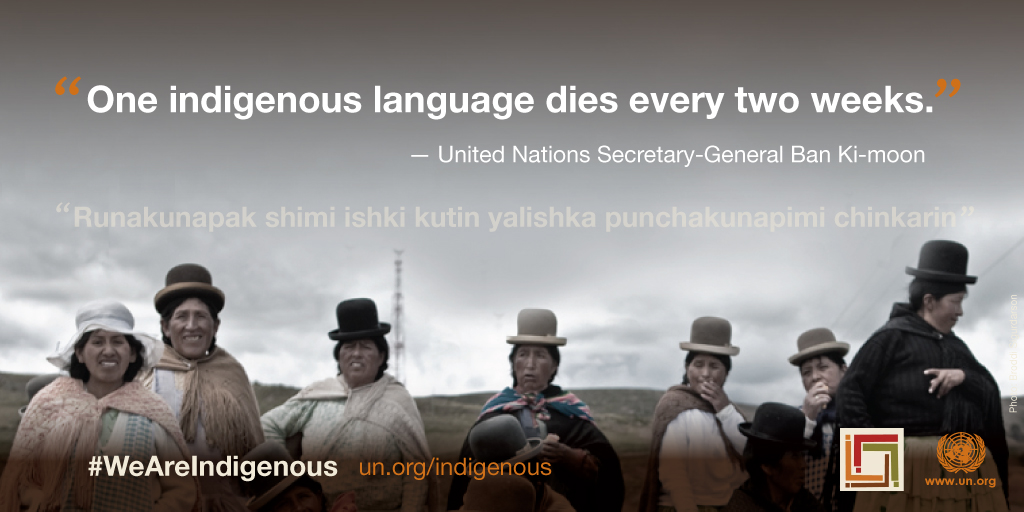
19-21 January 2016 at the United Nations Headquarters, New York
Indigenous languages are key to ensure the continuation and transmission of culture, customs and history as part of the heritage and identity of indigenous peoples. ‘It is usually estimated that there are between 6,000 and 7,000 oral languages in the world today. Most of these languages are spoken by very few people, while a handful of them are spoken by an overwhelming majority of the world. About 97% of the world’s population speaks 4% of its languages, while only 3% speaks 96% of them (Bernard 1996: 142). A great majority of these languages are spoken by indigenous peoples, and many (if not most) of them are in danger of becoming extinct.’ As highlighted by the United Nations Secretary-General at the opening of the Permanent Forum on Indigenous Issues in 2011 – one indigenous language dies every two weeks.
The United Nations Permanent Forum on Indigenous Issues (UNPFII) is an advisory body of the Economic and Social Council (ECOSOC), with the mandate to discuss issues related to economic and social development, culture, the environment, education, health and human rights. At its fourteenth session in April-May 2015, the Permanent Forum recommended a three-day international expert group meeting on the theme “Indigenous languages”, which was approved by ECOSOC (decision 2015/43). Following up on this, UN DESA/DSPD has organized the expert group meeting on “Indigenous languages" at UN Headquarters in New York from 19 to 21 January 2016. This was the second international expert group meeting on indigenous languages organized by the UN DESA. It built upon the findings and recommendations of the 2008 expert group meeting on the principles of cultural diversity and indigenous languages as a way to promote intercultural dialogue and affirm indigenous peoples’ identity.
Report of the expert group meeting on 'Indigenous languages: preservation and revitalization' AR | EN | ES | FR | RU | ZH
Please find below information related to the meeting:
- Concept Note
- Programme of Work
- Compilation of recommendations related to indigenous languages adopted by the Permanent Forum on Indigenous Issues
- Report on Indigenous Languages from the Expert Group Meeting 2008 (E/C.19/2008/3 )
- Study on languages and cultures by the Expert Mechanism on the Rights of Indigenous Peoples (A/HRC/EMRIP/2012/3)
- Indigenous children's education and indigenous languages (E/C.19/2005/7)
- Declaration and Programme of Action of the Global Forum of Indigenous Peoples and the Information Society (The Geneva Declaration - E/C.19/2004/3 )
- Report of the expert group meeting on 'Indigenous languages: preservation and revitalization' AR | EN | ES | FR | RU | ZH
United Nations system' documents related to the indigenous languages
- Indicators relevant for traditional knowledge and customary sustainable use (UNEP/CBD/WG8J/8/9)
- CBD's Global Biodiversity Outlook 4
Video presentations*
- Indigenous language digital activism network, Raising voices
- Message by Renata Flores, Quechua Activist and Musician
Other Resources*
- Presentation by Craig Cornelius
- Presentation by Thierry Kranzer
- Paper by Valerie Galley (2009) on An Aboriginal Languages Act
- Paper by Valerie Galley (2009) on Reconciliation and Revitalization of Indigenous Languages
* The views and opinions expressed in these papers are those of the authors and do not necessarily represent official policy or positions of the Secretariat of the Permanent Forum on Indigenous Issues/DSPD/DESA.
Papers submitted by experts*
- Paper submitted by Mr. Mathura Bikash Tripura (EN)
- Paper submitted by Ms. Tatiana Degai (EN)
- Paper submitted by Ms. Elisa Loncon Antileo (SP)
- Paper submitted by Mr. Richard Grounds (EN)
- Paper submitted by Ms. Amy D Kalili, Hawai’I (EN)
- Paper submitted by Ms. Sandra Inutiq (EN)
Papers submitted by Governments
Papers submitted by Indigenous Peoples*
- Closing remarks by Mr. Lenni Montiel, Assistant Secretary-General for Economic Development, DESA
- Group of Friends on Indigenous Peoples (Australia, Argentina, Brazil, Bolivia, Canada, Colombia, Denmark, El Salvador, Finland, Guatemala, Mexico, Nicaragua, Norway, New Zealand, Spain and Peru)*
- United Confederation of Taíno People*
- Indian Treaty Council and the National Native American Boarding School Healing Coalition*
- REDPIA-Mexico and Semillas School University L.A. (ES)*
UN Webcast:
Press conference: Indigenous language: preservation and revitalization with Chief Edward John, Tatiana Degai and Amy Kalili
UN Radio:
Mothers helped save Hawaiian language from extinction (EN)
A spoken language "disappears every 2 weeks" (EN)
Expertos abogan por la preservación y revitalización de las lenguas indígenas (SP)
A la reconquista de las lenguas indígenas en América Latina (SP)
Un llamado para salvar las lenguas indígenas (SP)
Langues autochtones: comment les préserver et les révitaliser (FR)
Do Xingu à ONU: indígena brasileiro pede valorização do Tupi (POR)
Представительница коренного народа Камчатки рассказала нашему Радио о местных традициях (RU)
В штаб-квартире ООН побывала представительница коренного народа Камчатки – ительменов (RU)
Digital Cards (download):
 Welcome to the United Nations
Welcome to the United Nations



